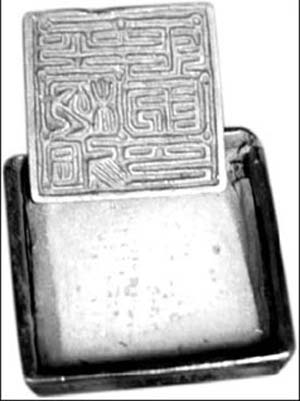
The religious seal handed down by Wang's ancestors.(Photo Source: China Daily)
"The most important attribute for a Shibi is a good memory," says Wang. There are hundreds of thousands of words for the Qiang scriptures and he is one of a dozen Shibis well versed in most of them.
To make a living, villagers used to carry packs of tea across mountains to Dujiangyan. At narrow mountain passes, bandits would rob them and even push victims down the cliff.
Life was easier for Shibis. A ceremony for a deity's blessing could bring the shaman 35 kg of corn and six big pancakes. He also had a share of the sacrificial items. They would hold a dozen such ceremonies in a year.
But being a Shibi always meant more about status than material gain. Wang treasures a hat made of monkey skin and a religious seal handed down the generations - both are symbols of his high status. Whenever a Shibi enters a house, the most honored seat is reserved for him and in the past, Shibi was the de facto village chief.
Wang recalls joining his father in his first Grand Ceremony to pay tribute to the God of the Mountain. Torches blazed throughout the village, everyone dressed up in holiday gear and three shots were fired to welcome the father and son.
He was only 13 but Wang clearly sensed everyone's reverence for him, as they instructed villagers to set up banners, tie three white goats at a holy tree and each family putting two cocks in the cage.
At the beat of the drum of goat skin, Wang followed his father to chant the birth of heaven and earth, the deeds of ancient kings and the long, treacherous exodus away from their ancestral homes. They kept singing until dawn.
However, Wang has one lifelong regret: He did not have a formal ceremony, called gai gua, to introduce him into the Shibi culture. More than 20 senior Shibis from far and wide would sit in a circle, each chanting a passage of scripture but leaving a few sentences for his neighbor to complete. In the presence of the whole village, the Shibi who failed to finish would be in disgrace.
When the chanting ended, a senior Shibi would lead the young shaman into the mountains. Legends say Shibis descended from heaven and must offer their gratitude. Before they reached the peak, the guide would leave the young to go on until he heard a sound that meant "the Jade Emperor had approved of him".
And what if nothing is heard?
"The mountain is big. How can there be no sound!" Wang laughs.
The tradition has suffered greatly in recent years. During the cultural revolution (1966-76), religious practices were banned as superstitions. Nowadays, Shibis are no longer held in high esteem in the Qiangfeng village, whose focus has shifted to the outside world, thanks to the advent of a cement road and TV. Instead of singing old mountain songs, the young hum pop songs, rejoice over football matches and watch sitcoms on TV.
Wang's hopes of a proper gai gua ceremony faded until one day in the 1980s, a relative, who was also a Shibi, brought him to the statue of the God of Shibi. He said: "Please forgive us for not being able to perform the ritual. He who stands behind me is now introduced to our sacred realm."
That humble ceremony is not his greatest regret, though. During the "cultural revolution", he wasn't able to carry out rituals for his deceased wife and was forced to bury her in a hurry. Then, last winter, his elder daughter died when she rolled down the snow-covered mountain while gathering firewood. Now, his own home has been crushed and he has to live with his younger daughter.